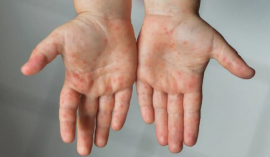
South Africa has recorded 40 new laboratory-confirmed measles cases in the past week, the National Institute for Communicable Diseases (NICD) said on Friday.
According to the NICD, it has tested 5 335 serum samples for measles since the outbreak last year, 865 of which (16%) were confirmed positive.
Meanwhile, the public health institute said the percentage of samples testing positive (PTP) decreased from 22% of 255 samples tested in the previous week, compared to 14% of 214 samples last week.
Sporadic cases were reported in all nine provinces in South Africa in 2022.
However, as of 25 March 2023, measles outbreaks were declared in eight provinces, except for the Eastern Cape.
The outbreak was first declared in Limpopo in October 2022.
In the past week, the NICD said, no new cases were reported in Mpumalanga, Northern Cape, and Western Cape.
“The measles strain detected in Limpopo and the North West is genotype D8, similar to the strain in Zimbabwe in the 2022 outbreak,” the institute said.
In the provinces, the most affected age groups are still the five to nine-year-olds (43%), with a considerable proportion of cases among children aged between one and four (24%) and those aged between 10 and 14 (19%).
The institution said vaccination campaigns should also include children aged 10 to 14.
Meanwhile, the majority of cases (68%) were reported from primary healthcare facilities, and the highest proportion of infections were detected in hospitals (55%) in children under the age of one.
According to the NICD, there are suggestions that the infection incidence is likely increasing.
In Limpopo, Greater Sekhukhune and Waterberg drive the peak, while Ekurhuleni Municipality pushes the numbers in Gauteng.
In contrast, the numbers in Mpumalanga and the North West suggest infection incidence is likely decreasing.
A virus in the paramyxovirus family, which infects the respiratory tract, and then spreads throughout the body, causes measles.
According to the World Health Organisation (WHO), measles is a human disease not known to occur in animals.
It can lead to major epidemics with significant morbidity and mortality, especially among vulnerable people.
These include young and malnourished children, pregnant women and immunocompromised individuals, including those with HIV, cancer or treated with immunosuppressive.
Measles can cause serious complications, including ear infections, severe diarrhoea, blindness, encephalitis, pneumonia, and death.
Members of the public are urged to ensure their children are vaccinated against measles. – SAnews.gov.za


